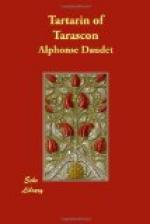In the middle of the room was a table. On the table was a flagon of rum, a turkish tobacco pouch, The voyages of Captain Cook, stories of adventure, treatises on falconry, descriptions of big-game hunts etc... and finally seated at the table was the man himself. Forty to forty-five years of age, short, fat, stocky and ruddy, clad in shirt-sleeves and flannel trousers, with a close-clipped wiry beard and a flamboyant eye. In one hand he held a book and with the other he brandished an enormous pipe, its bowl covered by a metal cap; and as he read some stirring tale of the pursuit of hairy creatures, he made, pushing out his lower lip, a fierce grimace which gave his features, those of a comfortable Tarascon “Rentier”, the same air of hearty ferocity which was evident throughout the whole house. This man was Tartarin... Tartarin de Tarascon... the intrepid, great and incomparable Tartarin de Tarascon.
At that time Tartarin was not the Tartarin which he is today, the great Tartarin de Tarascon who is so popular throughout the Midi of France, however, even at this epoch, he was already the king of Tarascon.
Let us examine how he acquired his crown. You will be aware, for a start, that everyone in these parts is a hunter. From the highest to the lowest hunting is a passion with the Tarasconais and has been ever since the legendary Tarasque prowled in the marshes near the town and was hunted down by the citizens.
Now, every Sunday morning, the men of Tarascon take up arms and leave town, bag on back and gun on shoulder, with an excited collection of dogs, with ferrets, with trumpets and hunting horns, it is a splendid spectacle.... Sadly, however, there is a shortage of game... in fact there is a total absence of game.... Animals may be dumb but they are not stupid, so for miles around Tarascon the burrows are empty and the nests abandoned. There is not a quail, not a blackbird, not the smallest rabbit nor even the tiniest wheatear.
These pretty little Tarascon hills, scented with lavender, myrtle and rosemary are very tempting, and those fine muscat grapes, swollen with sugar, which line the banks of the Rhone, are wonderfully appetising... yes, but there is Tarascon in he distance, and in the world of fur and feather Tarascon is bad news. The birds of passage seem to have marked it with a cross on their maps, and when the long wedges of wild duck, heading for the Camargue, see far off the town’s steeples, the whole flight veers away. In short there is nothing left by way of game in this part of the country but an old rascal of a hare, who has escaped by some miracle the guns of Tarascon and appears determined to stay there. This hare is well known. He has been given a name. He is called “Speedy”. He is known to live on land belonging to M. Bompard... which, by the way, has doubled or even tripled its value. No one has yet been able to catch him, and at the present time there are not more than two or three fanatics who go after him. The rest have given up and Speedy has become something of a protected species, though the Tarasconais are not very conservation minded and would make a stew of the rarest of creatures, if they managed to shoot one.




